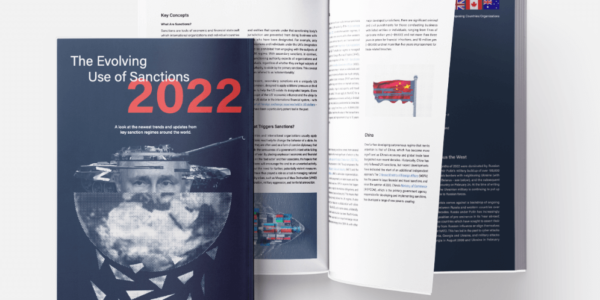

The war in Ukraine has triggered global sanctions and embargoes on an unprecedented scale. With Western countries increasingly keen to avoid direct military confrontations, the ability to impact the economies of ‘aggressors’ has become an important diplomatic tool.
The growing use of embargoes has been especially notable since the end of the Cold War. Of the 28 mandatory UN arms embargoes, 26 were passed in 1990 or later.
What are sanctions?
Sanctions are restricted measures that can be applied both broadly, on specific industries or countries, and selectively, on individuals. Sanctions can be issued to fulfil a wide range of purposes, from blocking the trade of certain commodities to complying with international obligations. Sanctions are being increasingly utilized by states to fight economically, rather than physically. As such, sanctions have become a common tool in foreign relations, peacekeeping and conflict resolution.
In order to ensure regulatory compliance, financial institutions are required to consult sanctions lists when conducting business with foreign customers.
What are embargoes?
While sanctions may target specific trading activities or individuals, embargoes are applied much more broadly. They often comprehensively prohibit trade with a target country, or imports from, or exports to, that country.
Both are powerful tools used to restrict commerce or exchange with a specified person, entity or country, usually as a result of political or economic problems.
Types of embargoes
There are different types of embargoes. A trade embargo refers to the banning of imports or exports, or both, of goods from a specified country.
This can be narrowed down to specific strategic types of embargoes that restrict only the import and export of certain types of goods, to protect particular animals, people or plants for example.
Meanwhile, a military or arms embargo prevents the exchange of military goods with a country, while a fuel embargo will target only trades of oil or other fuels.
International Embargo on Russia
Following the Crimea invasion in 2014, Western nations placed a raft of sanctions and embargoes on Russia, including limiting access to Western financial markets and services, and embargoes on the export of high-tech oil exploration and production equipment, and military and dual-use goods.
Russia hit back with embargoes on the import of a variety of food, including dairy products, from those countries.
While Russian countermeasures have so far been limited in response to global sanctions relating to the Ukraine conflict, as time goes on these may become more significant.
In March 2022, the US and UK announced international embargoes on all oil imports from Russia, and Canada and Australia later followed suit. The EU has proposed banning Russian oil by the end of 2022, though tensions remain with some member states, especially Hungary, which has already been offered an extra year to find alternative sources.
“We will make sure that we phase out Russian oil in an orderly fashion, to maximize pressure on Russia, while minimizing the impact on our own economies,” European Commission President, Ursula von der Leyen said.

The Evolving Use of Sanctions
Explore the evolving and intersecting world of sanctions and embargoes in our global guide.
Download the guideOther Globally Embargoed Countries
Of course, Russia is not the only nation impacted by global sanctions and embargoes.
Embargo on North Korea
Since 2006, the UN Security Council has adopted nine major sanctions resolutions on North Korea in response to the country’s nuclear and missile activities. These include embargoes on the import and export of weapons, including small arms. However, a March 2020 report by independent advisors to the UN revealed that North Korea continues to successfully evade these measures, while advancing its nuclear program.
North Korea has also been a major focus of unilateral action by Japan, which imposed an import embargo on the country in 2006, and an export embargo in 2009. In April 2021, Japan extended these measures with a further two-year ban on all trade, and prohibited the docking of all North Korean-registered ships, or vessels that have called at a North Korean port.
Embargo on Cuba
Implemented by President Kennedy under the terms of the Trading with the Enemy Act 1917, the Cuban Assets Control Regulations came into effect on July 8 1963, and represented a full trade embargo prohibiting all imports and exports between the US and Cuba.
This comprehensive international embargo has served as the backbone of the US’s Cuba sanctions regime since the 1960s, applicable to any individual or entity subject to US jurisdiction. US-Cuba relations began to thaw in the 21st century, leading to an easing of sanctions under President Barack Obama. However, under the Trump administration, many of the moves to ease restrictions were reversed. While the Biden administration has eased restrictions on remittances and travel, it has left the trade embargo unchanged.
Embargo on Iran
Iran has been the subject of global sanctions and embargoes over the past several decades. These have broadly comprised economic restrictions in response to the Iranian government’s involvement in international terrorism, human rights violations and its development of nuclear weapons.
In 2015, the five permanent UN Security Council nations plus Germany reached a provisional agreement with Iran regarding its nuclear weapons program. Known as the Joint Comprehensive Plan of Action (JCPOA), it created a framework for lifting the majority of sanctions against Iran in return for limits on Iran’s nuclear programs that would last for at least 10 years. Following the agreement, most international embargoes and sanctions against Iran were lifted in early 2016.
In 2018, the Trump administration withdrew the US from the JCPOA and reimposed measures. Some sanctions have since been dropped by the US in a “good faith approach” to ongoing negotiations.
Embargo on Libya
With the fall of Muammar Gaddafi and the onset of civil war in 2011, the UN-imposed an arms embargo on the country and a range of travel bans and asset freezes against regime figures.
Embargoes on Syria
The country has been listed as a State-Sponsor of Terrorism by the US since 1979. With the advent of the civil war in 2011, the Assad regime has been subject to a complete export embargo by the US; an oil trade embargo by the US, EU, and other western countries; wide-ranging financial sanctions and asset freezes; and travel bans on senior regime members. In 2021, the EU extended its restrictive measures against Syria for an additional year.
Sanctions and Embargoes: Do They Work?
Some analysts have argued that ongoing events such as military parades demonstrate that international embargoes on arms control focused on countries like Russia and North Korea have failed. Globally embargoed countries have sought ways to get around restrictions, using illicit networks to evade measures when possible.
The UN recommends the use of embargoes and sanctions only as part of a wider strategy, and there are suggestions that their impact is not always as intended. Unforeseen consequences have included harm to citizens in target countries, lost revenues for the issuing country and its allies, and increased economic isolation.
Sanctions risk management
It is easy for businesses to become focused entirely on the major developments of ongoing crises that are covered by the media, calibrating their controls to “headline” sanctions risks.
Instead, firms need to ensure that they are fully aware of all the potential risks they face, and have access to data and platforms that will reduce their risk of unexpected exposures. Breaches are breaches – regardless of how well-known the triggering cause might be.
Teams need to monitor the increasing number of embargoes and sanctions, and assess what staffing and resources may be needed to maintain compliance over the medium-to-long-term.
The State of Financial Crime 2025
Our annual report builds on a survey of 600 compliance leaders and detailed industry expertise to offer a roadmap for 2025.
Download your copyOriginally published 16 June 2022, updated 22 January 2025
Disclaimer: This is for general information only. The information presented does not constitute legal advice. ComplyAdvantage accepts no responsibility for any information contained herein and disclaims and excludes any liability in respect of the contents or for action taken based on this information.
Copyright © 2026 IVXS UK Limited (trading as ComplyAdvantage).
